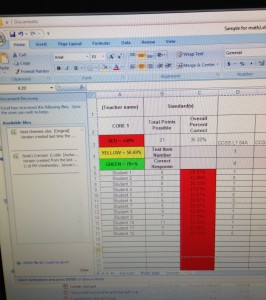 (For newbies and those who are drowning in data demands. Please feel free to share this with administrators.)
(For newbies and those who are drowning in data demands. Please feel free to share this with administrators.)
Are we agreed on the content and standards we intend to teach? What topics are missing? Can we teach these standards in the time available? If not, what will we jettison? Can we have the tests and instructional template finished before the unit begins?
How will we get comparable data? If people don’t know how to get comparable data, how will we support them? How will we encourage them?
Data needs a basis of comparison that is accessible and shared. Can everyone get at the data? When will we meet to discuss the data? When will we have emergency meetings?
How will we catch up students if other classes are cruising ahead? Where exactly did it go wrong in our lower-functioning classes? Did it go wrong? (Some classes are stronger than others! Don’t let anyone tell you otherwise.) Are we keeping current with student progress? Do we need more classwork, homework, or quizzes so we can keep track of student progress before our spreadsheets gets to messed up? When will we address any implied need for additional materials, instruction and quizzes?
How do we know when our students have learned the new content? Given that averages mask individual results, how will we know when individual students run into trouble? How will we address this? Item analysis helps here, but what else can we do to provide remediation to individual students?
Eduhonesty: Probably many new teachers are sitting quietly in data meetings. Some will leap in to put those spreadsheets together, but others may feel as if they are too new to the scene to voice strong opinions.
You need to stand up if data gathering seems to be adversely affecting instruction. Critical questions above: Can we teach these standards in the time available? What will we jettison if we cannot? How will we know when students need remediation? What will we do to help them?
The data is not in charge of you. You are in charge of the data. If necessary, look at those spreadsheets and say aloud, “You are not the boss of me!” in your best pugnacious, toddler voice. Then start figuring out what you need to do to get your students where you want them. Share those views with your team.
And, when necessary, hold your ground.
